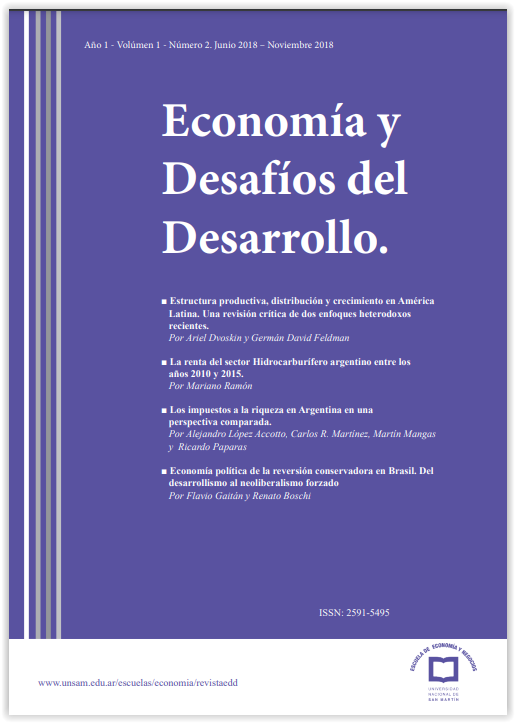Productive Structure, Distribution and Growth in Latin America.
A Critical Review of Two Recent Heterodox Approaches.
Keywords:
distributive conflict, new-structuralism, new-developmentalism, exchange rate, economic growthAbstract
In this paper we develop a theoretical framework to critically examine two recent approaches, whose main conclusions and policy prescriptions for Latin American countries heavily depend on the prevailing productive structure of the economy: the New-Structuralism and the New-Developmentalism. We argue that: a) although each view assumes a different pattern of specialization, both consider that the prevailing technical conditions are a purely technical datum of the economy, which cannot be modified by changes in the conditions that regulate income distribution; b) the growth regimes adopted by each of these positions are valid only under very restrictive conditions, and are therefore inadequate to explore the challenges of development faced by Latin American peripheral economies. As a result, we warn about the potential risks of employing exchange rate policy –the key instrument under both views- as a fundamental tool for promoting growth.
References
Bhaduri, A. y S. Marglin (1990), “Unemployment and the Real Wage: The Economic Basis for Contesting Political Ideologies”, Cambridge Journal of Economics, 14, pp. 375-93.
Bielschowsky, R. (2009), “Sesenta años de la cepal: estructuralismo y neoestructuralismo”, Revista CEPAL, Vol. 97, Abril, pp. 173-194.
Blecker, R. (1989), “International Competition, Income Distribution and Economic Growth,” Cambridge Journal of Economics, 13(3), pp. 395-412.
Bresser Pereira, Luiz Carlos (2008), “The Dutch desease and its neturalization: a Ricardian approach”; Brasilian Journal of Political Economy, Vol. 28(1): 47-71.
Bresser Pereira, Luiz Carlos (2012), “Summing Up Structuralist Development Macroeconomics and New Developmentalism”, Challenge, Vol. 55 (5): 59-78.
Bresser Pereira, Luiz Carlos (2016), “Reflecting on New Developmentalism and Classical Developmentalism”, Review of Keynesian Economics, Vol. 4(3): 331–352.
Bresser Pereira, Luiz Carlos; Oreiro, Jose Luis; Marconi, Nelson (2014), “A Theoretical Framework for New Developmentalism”, in L. C. Bresser Pereira, Jan Kregel and Leonardo Burlamaqui (eds.), Financial Stability and Growth London: Routledge: 55-73.
Cesaratto, S. (2015), "Neo-Kaleckian and Sraffian controversies on the theory of accumulation". Review of Political Economy, 27(2), pp. 154-182.
Damill, M; Frenkel, R (2017), “Symposium: Dilemmas of exchange rate and monetary policies in Latin America”; Journal of Post Keynesian Economics, DOI: 10.1080/01603477.2017.1343079
Dvoskin, A.; Feldman, G. (2015), “Política cambiaria, distribución del ingreso y estructura productiva”, en A. Bárcena, A. Prado y M. Abeles (eds.), Estructura productiva y política macroeconómica. Enfoques heterodoxos desde América Latina. Santiago: CEPAL.
Dvoskin, A.; Feldman, G. (2017a), “Income Distribution and the Balance of Payments. A Formal Reconstruction of Some Argentinian Structuralist Contributions. Part I: Technical Dependency”, Review of Keynesian Economics (próximamente).
Dvoskin, A.; Feldman, G. (2017b), “Income Distribution and the Balance of Payments. A Formal Reconstruction of Some Argentinian Structuralist Contributions. Part II: Financial Dependency”, Review of Keynesian Economics (próximamente).
Dvoskin, A.; Feldman, G. (2018), “A Formal Assessment of New-Developmentalist Theory and Policy”, Brazilian Journal of Political Economy (próximamente).
Dvoskin, A.; Feldman, G.; Ianni, G. (2018), “New-Structuralist Exchange-Rate Policy and the Pattern of Specialization in Latin American Countries”, Centro Sraffa Working Papers, No 28. Febrero
Frenkel, Roberto (2004), “Real exchange rate and employment in Argentina, Brazil, Chile and Mexico”, Iktisat Isletme ve Finans vol. 19, issue 223: 29-52.
Frenkel, R.; Ros, J. (2006), “Unemployment and the Real Exchange Rate in Latin America”, World Development Vol. 34(4), pp. 631–646.
Kurz, H.; Salvadori, N. (1995), Theory of Production. Cambridge: Cambridge University Press.
Lavoie, M. (1996), “Traverse, Hysteresis, and Normal Rates of Capacity Utilization in Kaleckian Models of Growth and Distribution”, Review of Radical Political Economics, vol. 28(4), pp. 113-147.
Lavoie, M. (2001), “The reflux mechanism in the open economy”, in L.P. Rochon and M. Vernengo (eds.), Credit, Growth and the Open Economy: Essays in the Horizontalist Tradition. Cheltenham: Edward Elgar.
Martins Neto, A.; Tadeu Lima, G. (2016), “Competitive Exchange Rate and Public Infraestructure in a Macrodynamic of Economic Growth”, Metroeconomica (forthcoming). DOI: 10.1111/meca.12143.
Oreiro, J. L; Missio, F.; Jayme Jr., F. (2015), “Capital Accumulation, Structural Change and Real Exchange Rate in a Keynesian-Structuralist Growth Model”, Panoeconomicus, Vol. 62(2), pp. 237-256.
Pariboni, R. (2016), “Autonomous demand and the Marglin–Bhaduri model: a critical note”, Review of Keynesian Economics, Vol. 4(4), pp. 409–428.
Rapetti, M. (2013), “Macroeconomic Policy Coordination in a Competitive Real Exchange Rate Strategy for Development”, Journal of Globalization and Development, De Gruyter, vol. 3(2), pp. 1-31.
Rapetti, M. (2016), “The Real Exchange Rate and Economic Growth: Some Observations on the Possible Channels”, in Damill M., M. Rapetti and G. Rozenwurcel (eds.) Macroeconomics and Development: Roberto Frenkel and the Economics of Latin
America. New York: Columbia University Press, pp. 250-268.
Razmi, A. (2007), “The Contractionary Short-Run Effects of Nominal Devaluation in Developing Countries: some Neglected Nuances”, International Review of Applied Economics, Vol. 21(5), pp. 577-602.
Razmi, A.; Rapetti, M; Skott, P. (2012), “The Real Exchange Rate and Economic Development”, Structural Change and Economic Dynamics, 23(2), pp. 151–169.
Rodrik, D. (2008), “The real exchange rate and economic growth”, Brookings Papers on Economic Activity 39(2), pp. 365–439.
Ros, J. (2016), “The Real Exchange Rate, the Real Wage, and Growth: A Formal Analysis of the “Development Channel”, in Damill M., M. Rapetti and G. Rozenwurcel (eds.)
Macroeconomics and Development: Roberto Frenkel and the Economics of Latin America. New York: Columbia University Press, pp. 229-249.
Ros, J.; Skott, P. (1998), “Dynamic effects of trade liberalization and currency overvaluation under conditions of increasing returns”, The Manchester School; Vol. 66(4), pp.466-489.



